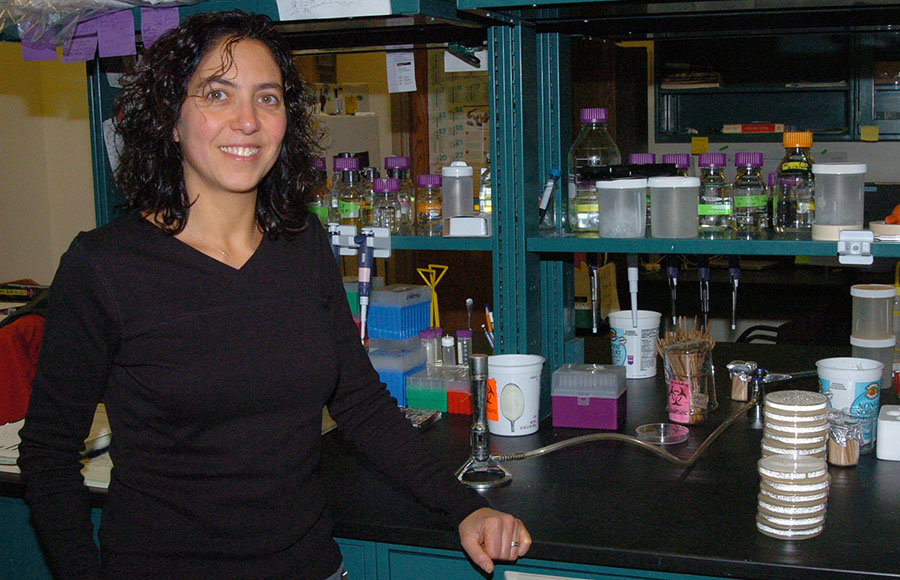BOONE — The bacterium that causes cholera has been a bit of a mystery to scientists since it was first identified in the mid-1800s.
Dr. Ece Karatan, an associate professor in the College of Arts and Sciences’ Department of Biology at Appalachian State University, hopes to unravel some of those mysteries, and in the process find ways to help mitigate the effects of the potentially deadly disease most common in Third World countries and areas with poor sanitation.
Karatan has received a three-year grant totaling $395,500 from the National Institutes of Health to support her work and that of graduate and undergraduate biology majors who will assist her.
Bacteria can produce a protective coating that provides protection against environmental factors like ultraviolet radiation from the sun or desiccation during times of low moisture.
Vibrio cholerae, the cholera-causing bacterium is no different. It generates a covering that protects it from the highly acidic environment of the human stomach as well.
“We have identified a pair of protein molecules that respond to distinct environmental cues in the form of small molecules called polyamines and signal the Vibrio cholerae to form biofilms,” Karatan said. “There is some evidence that once ingested, the bacteria then receive a signal to leave the biofilm once they exit the stomach in order to make the toxins that result in the cholera disease.”
Karatan began studying biofilms while in her post-doctoral program at Tufts-New England Medical Center. The field of research is relatively new. “At the time, biofilm research was just gaining popularity,” she said. “Researchers were just beginning to understand that there was a genetic basis to biofilm formation. It’s not random. There are genes that control biofilms. Until then, people pretty much thought biofilm was just slime.”
If biofilm formation can be disrupted, Karatan believes the harsh effects of cholera might be reduced.
Karatan’s research will focus first on understanding the life cycles of the bacteria as it “communicates” with the polyamine molecules that signal the manufacture of the sticky, sugary, protective biofilm coating.
Karatan said the NIH is interested in her research as a way to better understand biofilm formation related to Vibrio cholerae and chemical pathways that enable the protein molecules to regulate aspects of the cholera bacteria.
“That’s the first step, to really understand the physiology of the bacteria,” she said. “We have to understand the organism itself at the basic level to really be able to combat the disease. What comes after that, well the implications could be phenomenal,” she said.
The polyamine molecules that spur or inhibit production of biofilm are found in significant amounts in all foods, Karatan said. “If we can find the polyamines that make or break these biofilms and correlate those polyamines to the local foods found in areas where cholera remains a problem, maybe an adjustment in diet can prevent the harsh effects of cholera.”
(Pronunciation guide for Ece: eh Jay)
What do you think?
Share your feedback on this story.
About the Department of Biology
The Department of Biology is a community of teacher-scholars, with faculty representing the full breadth of biological specializations — from molecular genetics to landscape/ecosystem ecology. The department seeks to produce graduates with sound scientific knowledge, the skills to create new knowledge, and the excitement and appreciation of scientific discovery. Learn more at https://biology.appstate.edu.
About the College of Arts and Sciences
The College of Arts and Sciences (CAS) at Appalachian State University is home to 17 academic departments, two centers and one residential college. These units span the humanities and the social, mathematical and natural sciences. CAS aims to develop a distinctive identity built upon our university's strengths, traditions and locations. The college’s values lie not only in service to the university and local community, but through inspiring, training, educating and sustaining the development of its students as global citizens. More than 6,800 student majors are enrolled in the college. As the college is also largely responsible for implementing App State’s general education curriculum, it is heavily involved in the education of all students at the university, including those pursuing majors in other colleges. Learn more at https://cas.appstate.edu.
About Appalachian State University
As a premier public institution, Appalachian State University prepares students to lead purposeful lives. App State is one of 17 campuses in the University of North Carolina System, with a national reputation for innovative teaching and opening access to a high-quality, cost-effective education. The university enrolls more than 21,000 students, has a low student-to-faculty ratio and offers more than 150 undergraduate and 80 graduate majors at its Boone and Hickory campuses and through App State Online. Learn more at https://www.appstate.edu.












